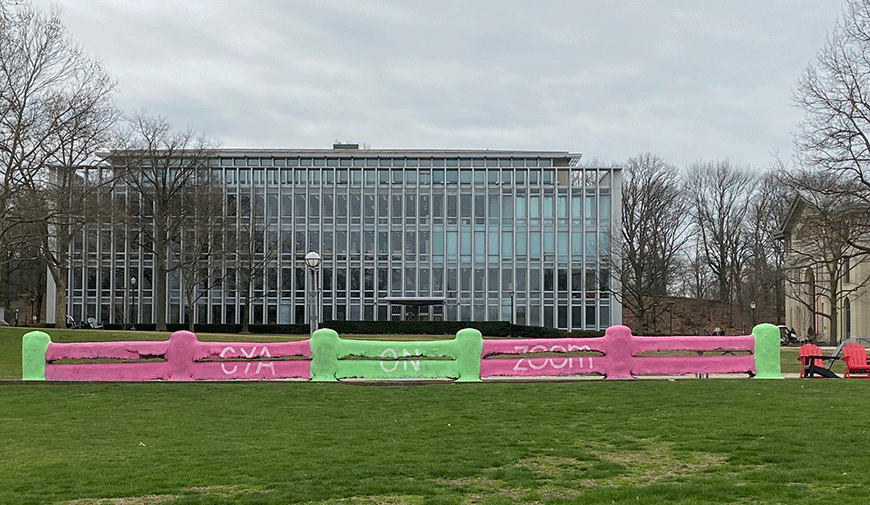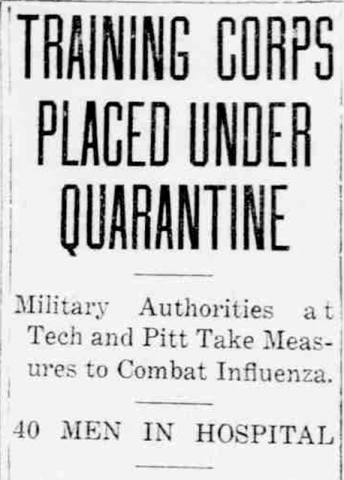
Students paint the Fence one last time before Spring 2020 classes moved online due to the coronavirus pandemic. Photo courtesy of the University Archives.
Over 100 years after the Spanish flu pandemic of 1918 disrupted operations on the Carnegie Mellon University campus, the university found itself once again adjusting to a new normal with the move to online instruction and closure of many campus facilities as a result of the coronavirus (COVID-19).
The impact of COVID-19 on Carnegie Mellon shares similarities to the Spanish flu pandemic. The University Archives — home to materials documenting the history of the university, including the events of 1918 — are taking steps to document this remarkable moment.
According to documents from the Archives, the university was quarantined in October 1918 to help slow the spread of the flu.
'It is not clear how big of an impact the quarantine had on the daily lives of students, faculty, and staff as there is almost no mention of it in 'The Tartan' newspaper from this period,' said Emily Davis, Project Archivist. 'However, there is some evidence of the flu's impact in various administrative records, like when the school funded a new infirmary to care for the sick, and refunded students the cost of dormitories that they had to vacate due to the pandemic.'
 At the time of the outbreak, the university had recently become a military training camp for the first World War. Student soldiers were restricted to the campus, with all students enrolled in non-military courses escorted to class. According to a November 28, 1918 Pittsburgh Gazette-Times article, the quarantine was lifted in time for student-soldiers to celebrate the armistice on November 11.
At the time of the outbreak, the university had recently become a military training camp for the first World War. Student soldiers were restricted to the campus, with all students enrolled in non-military courses escorted to class. According to a November 28, 1918 Pittsburgh Gazette-Times article, the quarantine was lifted in time for student-soldiers to celebrate the armistice on November 11.
'Without these important documents, it might have seemed like life on campus was normal during these times, and we wouldn't be able to draw parallels to our current situation today,' Davis said.
Detail from the October 5, 1918 edition of The Pittsburgh Gazette-Times chronicling the military quarantine on campus. Image courtesy of the University Archives.
The University Archives – located in Hunt Library – are currently seeking campus-wide emails, websites, social media, and other digital works related to the impact of the pandemic on campus. Material is gathered through email, web archiving platforms, and a CMU Box folder where members of the community can deposit documents. Physical materials will be collected once campus activities resume. Members of the community interested in this project should contact the Archives directly via email: archives@andrew.cmu.edu.
'We're presently focused on collecting public information, because we can do so with no disruption to the work being done by faculty and administrators to protect students and ensure continuity of learning,' said Julia Corrin, University Archivist.
The project was conceived and implemented after President Farnam Jahanian informed members of the campus community about remote instruction and other guidelines in a March 11 email communication. With updates occurring rapidly, the University Archives immediately began collecting and preserving digital data connected to COVID-19 — indexing relevant sources such as the university's coronavirus website and social media hashtags like #TartanProud.
'In unprecedented times, it is important to document and preserve relevant materials so that those studying the past can accurately inform the future,' said Keith Webster, Dean of University Libraries and Director of Emerging and Integrative Media Initiatives. 'With the impact of COVID-19 and its effects on the campus community, it is essential that the University Archives preserve this moment in history for future study.'
Acting as the bedrock for historical preservation on campus, records held by the University Archives are accessed and analyzed by researchers from around the world. If information is not properly collected and maintained, it may disappear from history completely.
'As archivists, we are responsible for selecting, preserving, and providing access to the records in our care,' said Kate Barbera, Assistant Archivist. 'For significant historical events — international, national or local — it is our responsibility to document the university's response and the impact on our community. Otherwise, we risk forgetting the lived experience of these events, whether it is the coronavirus of 2020 or the Spanish flu of 1918.'
